WAgN members visit Wayside Acres Goat Dairy in Perry County and hear from Dairy Extension Specialist Kerry Kaylegian.

PA Milk Regulations for Value-Added Dairy
Operating a value-added dairy can be a rewarding experience, and is best approached with knowledge. Milk is a highly nutritious food that supports the growth of pathogens - those organisms that can make people sick or worse. Therefore, the facilities and procedures required to operate a dairy are based in regulations that are put in place for the purpose of public safety. The decision about what products to sell will reflect your values and personal preferences - do you sell raw milk or raw aged cheese or make pasteurized products? These decisions should be made at the beginning of your venture, so that you can determine the needs of the facility and equipment.
The best piece of advice is to work with your local PDA Milk Sanitarian from the time you have the idea until the time you are making products, to ensure that all regulations are met and you spend the minimum amount of money for start-up. Dairy regulations are very specific starting with the construction requirements of the processing room, down to the types of materials used for equipment and supplies in the cheese room. The general guidelines for producing raw milk, including testing requirements, can be found in the PDA Raw Milk Permit Guidance Document, and the regulations for pasteurized products in Chapters 57a and 59a under the Milk Sanitation Program. The FDA's Pasteurized Milk Ordinance describes many aspects required of dairy farms and processing plants and is helpful whether you are selling raw or pasteurized products. Penn State has resources to help you and offers short courses in various aspects of dairy product manufacture and food safety; for more information contact Dr. Kerry Kaylegian, Dairy Foods Research & Extension Associate, kek14@psu.edu.
Pennsylvania Women's Agricultural Network
Address
302 Armsby BuildingUniversity Park, PA 16802
- Email pawagn@psu.edu
Pennsylvania Women's Agricultural Network
Address
302 Armsby BuildingUniversity Park, PA 16802
- Email pawagn@psu.edu

